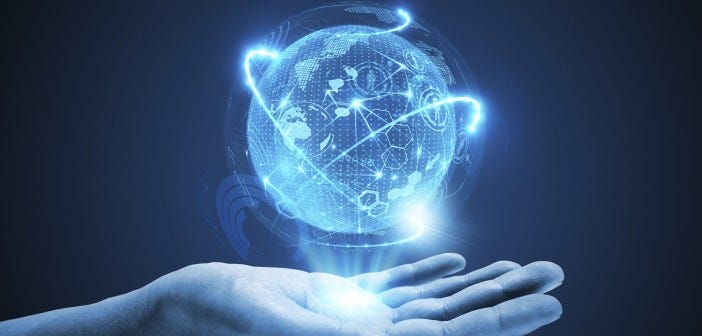
The central event of the 20th century is the overthrow of matter. In technology, economics and the politics of nations, wealth in the form of physical resources is steadily declining in value and significance. The powers of mind are everywhere ascendant over the brute force of things”.
Reid Hoffman quotes this futurist verse in his book Blitzscaling in his discussion of "Software Eating the World" where online channels drive businesses (old and new) and create new markets, ease efficiencies for consumers and businesses alike and increase opportunities for both entrepreneurs and new breed of gig workers to earn a living and accumulate wealth. Over the last 30 years, the Internet has indeed eaten the physical world but it has largely followed the macro-trends of the "old economy" in enabling new, centralized players to control the pipes, payments, access, and match-making (they resemble the "brute force of things" still).
We are now on the cusp of a whole new era of commercial transformation that will "eat the old". NFTs and digital native solutions are the next iteration of the ascendancy of “power of mind” and will undergird this new world, with blockchain and its revolutionary way to disseminate decentralized trust among commercial actors acting as the operating system. NFTs are the currency of this new world not just as medium of exchange but as we wrote in our May 2021 blog, they are much more, serving as operational business infrastructure, engagement with fans & users (community-building as form of sales promotion and even investment) and business model flexibility and scale.
NFTs enable the creation of new economies which with growth and scale, will embody all the components of physical economies - production, market-making, development and even investing and trade between them. It is this combination of digitally native micro-economies and global communities based on NFTs & blockchain that underpin the investment framework for what we call Web3 or the Digiverse.

Lets get some definitions out of the way -- aside from NFTs and Metaverse, the rest are natively branded!
<aside> 🗄️ NFTs: Datafile stored on a digital ledger, called blockchain, that certifies a digital asset to be unique and therefore not interchangeable. While copies of these digital items are available for anyone to obtain, NFTs are tracked on blockchains to provide the owner with a proof of ownership that is separate from copyright.
</aside>
<aside> 🔥 Passionware: Tools enabling the creation of products and services stemming from people’s own creativity - enabling anyone to be an entrepreneur, run a business to earn a living and, at the same time, fulfill one’s passions.
</aside>
<aside> ♻️ Web3 / Digiverse: group of inter-connected decentralized ecosystems built on technology protocols in which NFTs enable the creation and expansion of economies formed by communities and entrepreneurs seamlessly working together on a global scale.
</aside>
<aside> 💰 Me-Commerce: commercial transactions by single individuals or consortia earned directly from contributions to a decentralized network a.k.a "entreprenuer as contributor".
</aside>
<aside> 🔒 Ownership Legos: NFT-based building blocks which a creator can use to produce any type of ownership asset that can be packaged, disseminated and traded directly by the creator and their community using only NFTs.
</aside>
<aside> 🔰 Metaverse: often used for our definition of Digiverse but we will use its literal definition coined by Neal Stepheson in 1993: "a collective virtual shared space, created by the convergence of virtually enhanced physical reality and physically persistent virtual space, including the sum of all virtual worlds, augmented reality, and the Internet"
</aside>
While the Internet was transformational in nature, it really is an evolutionary step of taking old economy artifacts and putting them online, engendering scale and increase efficiencies. Moreover, the Internet does not provide equal access - regulatory and corporate permissions are still needed to access most content and services of the Internet (eg we cannot use Robinhood from Israel and most services are closed to those without access to banking or good financial systems)
The Web3 Digiverse represents a revolution. It may sound like hyperbole, but we believe it is hard to overestimate the ripple effects of the digitalization of everything and how it will impact every aspect of the economy far greater than that of the Internet on the "old economy".